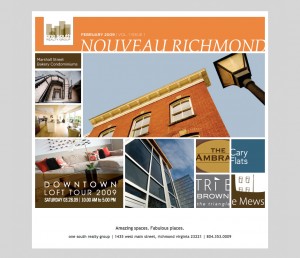
This is not a how to or step by step guide in turning an existing apartment complex into condominiums. For the most part, any decent real estate attorney can help you draw up ‘Condo Documents’ and have them registered with relative ease and for a reasonable fee. For less than $10,000, you can convert apartments to condominiums and suddenly have 6, 12, 25 or more units for sale.
But is it a good idea?
This article was written to help a developer or owner of an apartment complex to figure out if it is a good idea to invest the time, effort and money to convert the property. Just because the market has absorbed inventory to levels 75% lower than the height may not mean that conversion is the right idea. We will touch topics as diverse as financing, design, inventory, finishes and location as each can be a reason to NOT convert.
This graph shows the available condo inventory in the City of Richmond over the trailing 60 months. For a more detailed breakdown, check out our page on market stats.
What makes a good condo?
Design is crucial and the most fundamental of problems is as follows…the best apartments buildings are designed to maximize rental revenues and the best condo buildings are built to maximize sales revenues. The average unit size is approximately 10-15% smaller in an for rent design than in a for sale design. Tax credit and revenue maximization in apartment designs have forced the development model to decrease unit size while increasing unit count. The exact opposite makes a successful condominium building. Stated simply, if your two bedroom unit is 750SF and one (or both) of the bedrooms have a dimension less than 10′, you will be viewed by the market as a one bedroom unit and prices need to be adjusted accordingly.
What is the unit mix?
When buyers enter the market, they are almost ALWAYS looking for a 2 bedroom unit. While they may end up purchasing a 1 bedroom unit, it is invariably with a secondary space that can function as guest/office flex space. In effect, almost all spaces (excepting the VCU/MED market, which we will discuss later) need to be a ‘2 Function’ space where a bedroom + anther function can be handled within the unit. In the most successful apartment buildings, the mix is 60-70% one bedroom units. This is a sub-optimal mix for condominium design.
Should I vacate units?
YES. Since 2007, when we became heavily involved in the representation of multiple (20+) projects, we have had almost zero success in selling units that are tenant occupied. The reasons are varied (logistics, cleanliness, motivation, accommodation) but the primary reason is the appearance of lack of commitment by the developer to see the project through. In effect, the (un)willingness of a developer to lose rent sends the signal that the buyer is owning an apartment and the dangers of being an owner in a rental environment is not acceptable. There is a very high probability that the prospective buyer is coming from an apartment environment and wishes to leave the noise/lack of respect for others/indifferent management company/unreliable repairmen behind. A clear message of commitment to the conversion from the development group that the property will be converted is paramount. The amount of rental income that is sacrificed is more than mode up in ability to fetch a higher price.
Should I fix up my units?
In almost all cases, yes. If this is a Federal sand State HTC project, then it has been at least 5 years (and probably 6-8) since the units were new. The units are likely worn and slightly dated. Likewise, employ someone other than the repairman who is used to doing ‘turns’ as his level of finish is different than the expectation of the market.
What if I am in the VCU or Medical School Zone?
The marketplace changes slightly if you are within the two bubbles that surround the campus. The good news is that you have a pretty set pricing structure and it is based on the rental market. For the most part, if a parent can buy less expensively than renting, then they will buy. If the opposite is true, then they won’t. The bad news is that the magnificent design and spectacular finishes don’t matter and are lost on parents…it is about the numbers. If the parent can rent for less, they will. On a side note, one bedroom units work pretty better for medical students as they are looking for cheap, close and quiet.
What are my units worth?
Ask a Realtor and don’t assume that each floor is worth more than the lower one. The buying decision is based on a combination of layout, bedroom count, view, parking, outdoor space and light. These dimensions all change dramatically within a building and can impact values by 30% or more. The best apartment developers think in terms of rent per foot per month and they know that the difference between high and low is pretty tightly banded. In a condo, the developer needs to think in terms of price per unit and know that the market will harshly punish a flawed unit.
What is the deal with financing, anyway?
The condominium finance market is the most complicated and convoluted of all of the mortgage markets and cannot be explained in a few short sentences. Having a representative that understands ALL of the workarounds will probably mean the difference between success and failure of the project. Do not, under any circumstances, work with a mortgage company that has not been an exclusive lender in a new or converted condo community. I cannot express this strongly enough.
Well then, what WOULD work?
Mid-sized buildings (25-30 units) comprised of less than 20% commercial space with a 2 bedroom majority and in an area that is desired is ideal. It is helpful if the building is within proximity to either VCU Monroe Park or VCU Medical (as that gives you a natural market) and if it the rent per square foot has flattened or if the building is in need of a refurbishing. It also helps if the building can be phased (makes financing easier) and if the parking is secure.
Anything else?
Don’t assume that because you have a good apartment building that it will make a good condo building and do not think that just because there is an under-supplied market that any conversion will work. The buying market is just recovering from being badly burned and the willingness to take a leap of faith is largely gone. The group that reaches the market next with a good project will be rewarded. The group that brings the wrong project to the market or brings the right project to the market in the wrong way will be harshly punished for the mistake.

